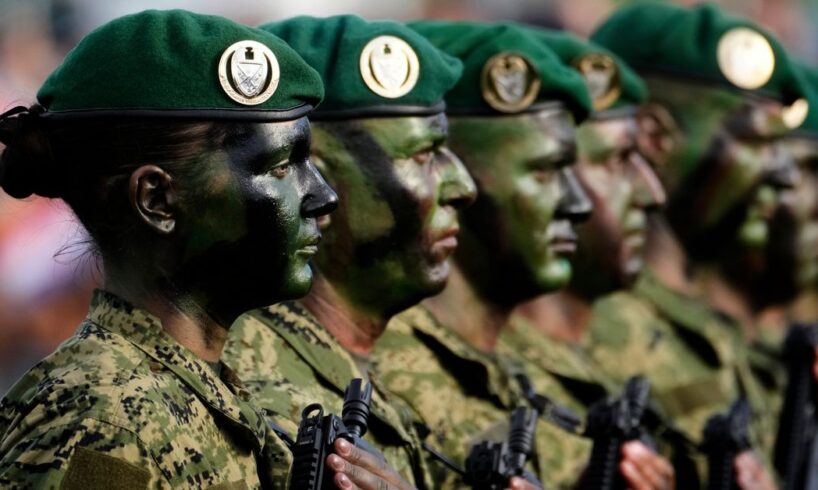
It is a debate many hoped would never be revived after the fog of war lifted: compulsory military conscription.
The Russia-Ukraine conflict has triggered several European governments to discuss or reinstate mandatory military service for the first time in decades.
NATO countries are now expected to meet the target of spending 5 per cent of annual GDPs on defence by 2035 as “profound security threats and challenges” threaten the EU.
Soldiers of the Bundeswehr’s Panzerbrigade 21 tank brigade seen during a visit in 2022 in Augustdorf, Germany. ((Photo by Andreas Rentz/Getty Images)
This ambitious target has generated an EU-wide drive to increase and fortify militaries.
Germany’s government this past week torpedoed a plan to bring back its formerly-abolished system of mandatory conscription following a government stoush over the issue.
Chancellor Friedrich Merz had advocated for bringing back compulsory service because he wanted to build the strongest conventional army in Europe in the face of Russian threats.
But his grand plan was reduced to a new system of voluntary service.
If this does not help strengthen the country’s dwindling military numbers, a nationwide conscription, known in German as “bedarfswehrpflicht”, may be reconsidered.
Compulsory conscription has successfully been reestablished in other EU countries.
Latvia reinstated mandatory service for men in 2024 after 18 years, which forces conscripts to serve 11 months minimum.
And conscription was also brought back in Ukraine in 2014 following the war in Donbas.
Despite the country previously abolishing conscription in 2008, the new law sailed through parliament as a response to the Russian war on Ukraine and rising tensions in the Middle East.
“We are seeing a rise in various types of threats … that demand swift and effective action from the broader community,” Defence Minister Ivan Anusic said.
Male Australian-Croatian nationals will need to report to the defence authorities of Croatia under the change which will come into effect on January 1 in 2026.
It will see 18,000 men enlisted each year for two months of training as they turn 18.
Failure to report to defence authorities is an offence.
Women are exempt from Croatia’s conscription.
Nearby Serbia moved to bring back compulsory military service this year after abolishing it 14 years earlier.
Croatian troops participate in a military parade marking 30 years since a key war victory, in Zagreb, Croatia in July 2025. (AP)
Serbian men will be made to take part in 60 days of training and 15 days of exercises, the government said in 2024.
Women are exempt from Croatia and Serbia’s conscription.
However gender exemption has been scrapped in some EU nations, such as Denmark.
Danish women can be called for up to 11 months of mandatory military service when they turn 18 after new rules were passed in parliament.
Before now, women could join the military on a voluntary basis.
Denmark has a lottery system that decides who gets drafted, which is used after volunteers are recruited.
Neighbouring nations Sweden and Norway also both enshrined mandatory conscription for women.
Sweden introduced it in 2017, while the Norwegian parliament brought in universal conscription for men and women in 2015.
Switzerland, meanwhile, also has a compulsory system for military service, which only applies to men.
Swiss citizens voted overwhelmingly to keep conscription during a referendum in 2013.
However the country appears to be slowly moving towards a gender-neutral model too.
A proposal for changing the military penal codes in Switzerland is under consultation.
The push comes as the Swiss army aims to rebuild ranks.
Ukrainian recruits are trained by members of the Danish military, in the east of England, Thursday, March 14, 2024. (AP)
Does Australia have compulsory military service?
Conscription during peacetime was abolished in Australia in 1972 as the end of the Vietnam War neared.
However the question of mandatory national service in Australia does arise now and again.
“It’s about giving as well as receiving and I think we do have to talk more about what we can give back to our country,” Abbott said at the time.
He claimed it would be nation-building and help to save “the anxious generation”.
In 2022, Defence Minister Richard Marles urged young Australians to enlist in the Defence Force amid a worrying shortage.





